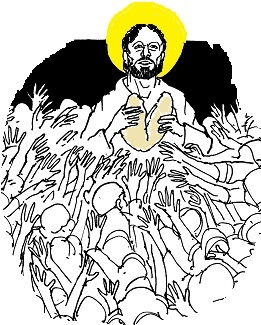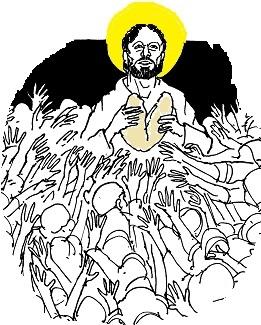

“If this endeavor is of human origin, it will not last. But if it comes from God, you will not be able to stop it” (Acts 5:38).
Acts 5:34-42; John 6:1-15
The fourth Gospel takes up the synoptic story of the multiplication of loaves and fishes and gives it an explicitly theological meaning as a foreshadowing of the Eucharist. Why the author does this may be his response to critics of the Jesus Movement who said he was just another messianic pretender executed by Rome for sedition. The fourth Gospel makes clear that, as Jesus tells Pilate, his “kingdom” was not of this world.
In Acts, Gamaliel, the revered teacher and mentor of Saul of Tarsus (Acts 23:3), tells the Sanhedrin to leave the Jesus Movement to God, who will either support it or let it slip into history like other failed messianic revolts. Gamaliel’s description might easily have applied to today’s Gospel. Jesus meets with 5,000 followers in the wilderness at Passover time, when pilgrims would normally gather in Jerusalem to commemorate their Exodus from slavery to freedom. He is a charismatic leader and healer, and able to feed the crowds miraculously. No wonder they try to make him their king.
Jesus flees into the mountains to pray. Was this the moment when Satan’s desert temptation to power became evident? Jesus rejects it, and the fourth Gospel uses the incident to launch into a long discourse on the “Bread of Life.” Jesus has no ambitions to be an earthly leader. He is the new Moses, manna from heaven, the fulfillment of God’s promise to be with us as food for the journey.
Keeping Christianity out of politics has been a complex problem in church history right down to contemporary debates about Liberation Theology and Pope Francis’ critique of global injustice and economic exploitation while insisting that the church transcends ideologies and political movements.
Easter plunges us into the debate as we seek to deepen our spiritual commitment to the crucified and risen Christ while discerning the implications of his presence in our lives. He is, we believe, present in the poor, the outcast and the oppressed, yet our advocacy must be with love, reconciliation and self-sacrifice instead of by force.
The Easter message is clear. A disciple does not take up arms but instead lays down his or her life to change the world. This is paradoxically how God loves a sinful world, and how we must imitate Jesus as disciples. Most revolutions replace one tyranny with another. Easter proposes a different way, a beautiful but exceedingly narrow path that will cost us everything but promises us the Beloved Community that God is eager to share with all of Creation.
Advertisement







